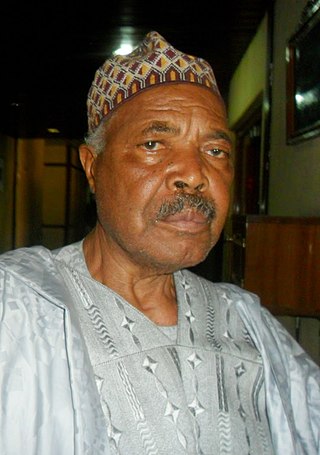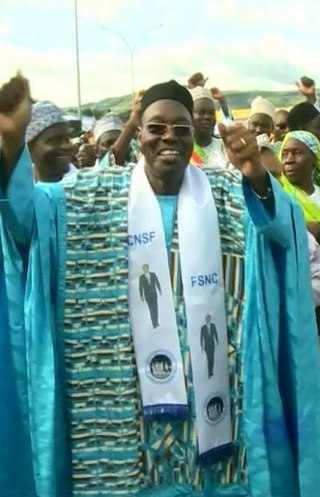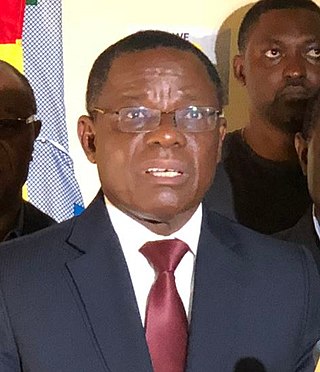
Politics of Cape Verde takes place in a framework of a semi-presidential representative democratic republic, whereby the Prime Minister of Cape Verde is the head of government and the President of the Republic of Cape Verde is the head of state, and of a multi-party system. Executive power is exercised by the president and the government. Legislative power is vested in both the government and the National Assembly. The judiciary is independent of the executive and the legislature. The constitution, first approved in 1980 and substantially revised in 1992, forms the basis of government organization. It declares that the government is the "organ that defines, leads, and executes the general internal and external policy of the country" and is responsible to the National Assembly.

Politics in Senegal takes place within the framework of a presidential democratic republic. The President of Senegal is the head of state and government. Executive power in Senegal is concentrated in the president's hands.

The politics of Zimbabwe occurs in a society deeply divided along lines of race, ethnicity, gender and geography. The ZANU–PF party has historically been dominant in Zimbabwe politics. The party, which was led by Robert Mugabe from 1980 to 2017, has used the powers of the state to intimidate, imprison and otherwise hobble political opposition in Zimbabwe, as well as use state funds and state media to advance the interests of the party.

Paul Biya is a Cameroonian politician who is the second president of Cameroon since 6 November 1982, having previously been the prime minister of Cameroon from 1975 to 1982. He is the second-longest-ruling president in Africa, the longest consecutively serving current non-royal national leader in the world and the oldest head of state in the world. He is regarded as an authoritarian leader and a dictator.

The Constitution of South Africa is the supreme law of the Republic of South Africa. It provides the legal foundation for the existence of the republic, it sets out the rights and duties of its citizens, and defines the structure of the Government. The current constitution, the country's fifth, was drawn up by the Parliament elected in 1994 in the South African general election, 1994. It was promulgated by President Nelson Mandela on 18 December 1996 and came into effect on 4 February 1997, replacing the Interim Constitution of 1993. The first constitution was enacted by the South Africa Act 1909, the longest-lasting to date. Since 1961, the constitutions have promulgated a republican form of government.

The Judicial Procedures Reform Bill of 1937, frequently called the "court-packing plan", was a legislative initiative proposed by U.S. President Franklin D. Roosevelt to add more justices to the U.S. Supreme Court in order to obtain favorable rulings regarding New Deal legislation that the Court had ruled unconstitutional. The central provision of the bill would have granted the president power to appoint an additional justice to the U.S. Supreme Court, up to a maximum of six, for every member of the court over the age of 70 years.

Elections in Cameroon occur in a system of electoral autocracy, as the ruling party manipulates elections and represses political opposition.

Simon Achidi Achu was a Cameroonian politician who served as the prime minister of Cameroon from 1992 to 1996. Previously he was Minister of Justice from 1972 to 1975. A leading member of the Cameroon People's Democratic Movement (CPDM), Achidi Achu was appointed Chairman of the National Investment Corporation in 2003, and he was elected to the Senate of Cameroon in 2013.

The National Assembly is the lower house of the Parliament of Cameroon. It has 180 members, elected for five-year terms in 49 single and multi-seat constituencies. Together with the senate, it constitutes the legislative arm of government.

The Constitution of Cameroon is the supreme law of the Republic of Cameroon. Adopted in 1972, it is Cameroon's third constitution. The document consists of a preamble and 13 Parts, each divided into Articles. The Constitution outlines the rights guaranteed to Cameroonian citizens, the symbols and official institutions of the country, the structure and functions of government, the procedure by which the Constitution may be amended, and the process by which the provisions of the Constitution are to be implemented.

The Constitution of Uruguay is the supreme law of Uruguay. Its first version was written in 1830 and its last amendment was made in 2004.

The Constitution of the Republic of Chad is the supreme law of Chad. Chad's seventh constitution, it was adopted in 1996, six years after President Idriss Déby rose to power following a successful rebellion against President Hissène Habré, this formal document establishes the framework of the Chadian state and government and enumerates the rights and freedoms of its citizens. In its current form, the contents of the Constitution include a preamble, 16 parts and 225 articles.
Dakole Daïssala was a Cameroonian politician and the President of the Movement for the Defence of the Republic (MDR), a political party based in Cameroon's Far North Region. He served in the government of Cameroon as Minister of State for Posts and Telecommunications from 1992 to 1997; subsequently he was a Deputy in the National Assembly from 1997 to 2002 and then Minister of Transport from 2004 to 2007. He served in the Senate from 2013 until his death.

The Government of the Republic of Kenya (GoK) is the national government of the Republic of Kenya located in East Africa. It is composed of 47 Counties, each county with its own semi-autonomous governments, including the national capital of Nairobi, where the national government is primarily based.

Issa Tchiroma Bakary is a Cameroonian politician who served in the government of Cameroon as Minister of Transport from 1992 to 1996 and has been Minister of Communication since 2009. He is the President of the Front for the National Salvation of Cameroon, a minor political party.

The Constitution of Kenya is the supreme law of the Republic of Kenya. There have been three significant versions of the constitution, with the most recent redraft being enabled in 2010. The constitution was presented to the Attorney General of Kenya on 7 April 2010, officially published on 6 May 2010, and was subjected to a referendum on 4 August 2010. The new Constitution was approved by 67% of Kenyan voters. The constitution was promulgated on 27 August 2010.

Maurice Kamto is a Cameroonian politician, professor and barrister. He is one of the founders of the Cameroon Renaissance Movement (MRC).

Since independence, corruption has been more than prevalent in Cameroon. In fact, corruption has become pervasive and has affected all sectors of the government and civil society including the executive, judiciary, police, and even the private sector. The main causes being a deep lack of political will to fight corruption and neopatrimonialism. Other causes include; personal interests and absence of duty conscience, weak judiciary and almost nonexistent opposition in the legislative, nepotism and favouritism, ineffective system of accountability, among others.

The Anglophone problem is a socio-political issue in the modern Republic of Cameroon, rooted in the country's German, British, and French colonial legacies. Anglophone (English-speaking) Cameroonians form a minority population of around 16 percent, mainly from the Northwest and Southwest regions that formerly constituted the Southern Cameroons, part of the former British Cameroon colonies. These Anglophone regions were formerly controlled by Britain as a mandate of the League of Nations, and then as a United Nations trust territory. During the Foumban Conference of 1961, territories with different colonial legacies were finally united into one state.

Presidential elections were held in Cameroon on 7 October 2018.

















